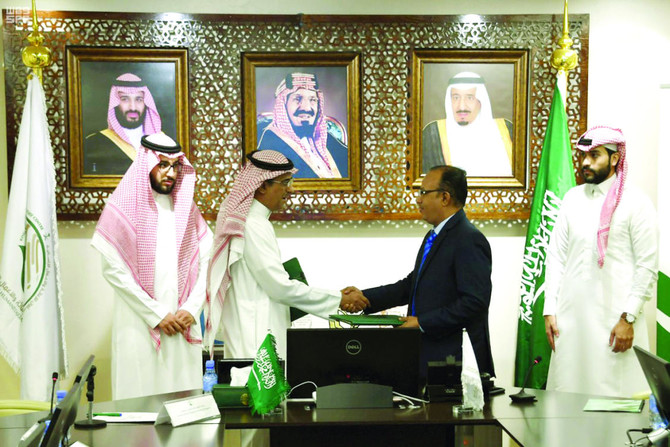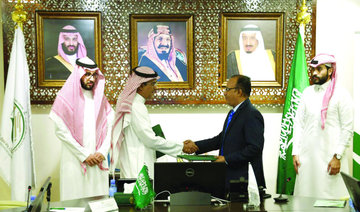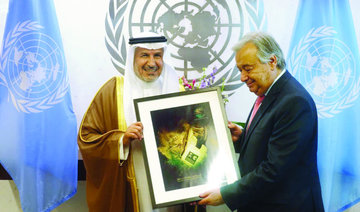RIYADH: The King Salman Center for Relief and Humanitarian Aid (KSRelief) signed contracts on Wednesday with several hospitals in Yemen to treat 650 victims of the current crisis in the country.
Ahmed bin Ali Bayez, KSRelief supervisor for operations and programs, signed on behalf of the Saudi humanitarian organization.
An executive contract was signed to treat wounded Yemenis with Al-Safwa Hospital in Taiz governorate, providing medical care to 150 injured persons, and two contracts with Al-Barihi Hospital in Taiz and Aden governorates to treat 300 patients.
Another contract was signed with Ben Zaila Hospital in Sayoun province to treat 200 wounded.
The contracts are a continuation of medical projects funded by KSRelief in coordination with the Higher Relief Committee represented by the Yemeni Ministry of Public Health and Population and local international partners to provide health services to Yemenis inside and outside their country.
Meanwhile, KSRelief freed and rehabilitated 40 Yemeni children, who had previously been conscripted by Houthi militias.
The children were returned to school and reintroduced to their peers, thanks to an integrated project implemented in the governorates of Maarib and Al-Jawf.
The center, through a specialized institute, rehabilitated the children, 20 each from Maarib and Al-Jawf, as a first stage, within a wider protection project for child soldiers under the age of 15.
According to the center, they will receive, psychological, educational, social and sports courses for a period of one month, supervised by qualified psychologists, all according to international standards for reintegration programs.
These children were forced into the service of the Houthi militias, where they took part in the fighting and supplied the militias with ammunition and food.
According to Yemeni government estimates, more than 10,000 children have been conscripted by Houthis to fight in their ranks.
This project is a major achievement for KSRelief in its efforts to alleviate the suffering of the Yemeni people during the ongoing crisis.
KSRelief signs contracts to treat 650 wounded Yemenis, rehabilitate 40 children conscripted by Houthis
KSRelief signs contracts to treat 650 wounded Yemenis, rehabilitate 40 children conscripted by Houthis

Three Spanish friends rewriting history to perform Hajj on horseback

- Pilgrims recreating historic 8,000 km route used by Andalusian Muslims
- Team supported financially by local Muslims during 7-month ride
Jeddah: Three friends rode on horseback from Spain to Saudi Arabia to perform the Hajj, reviving a pilgrimage route last used by Andalusian Muslims more than 500 years ago.
They reached Saudi Arabia’s Northern Borders region last week in time for Hajj after travelling through Spain, France, Italy, Slovenia, Croatia, Bosnia, Serbia, Turkiye, Syria and Jordan on a 8,000 km (4,970 miles) journey.
The three Spanish Muslims, Abdelkader Harkassi, Abdallah Hernandez and Tariq Rodriguez, are fulfilling a long-held ambition after embracing Islam 35 years ago.
The three riders are accompanied by Bouchaib Jadil, a construction master living in Spain, who is providing logistical support to the team by leading the way in a car.
It all started when Abdullah Hernandez reverted to Islam 35 years ago.
He told Arab News about how he felt grateful toward Allah for blessing him with guidance — Heidaya — and he promised to complete the Hajj pilgrimage the way his Andalusian ancestors did.
The team practiced for two years before setting off in October 2024 from Al-Monaster Mosque, south of Spain.
After crossing the border of Jordan on May 2, the three Spanish friends arrived in Qurayyat city in Al-Jawf Province, in northern Saudi Arabia on Friday after a remarkable seven-month horseback journey.
During their stop in Qurayyat, the pilgrims were hosted by the head of Al-Haditha Center, Mamdouh Al-Mutairi, who welcomed them to the Kingdom and wished them a pleasant stay and an acceptable and easy Hajj, meeting with students and supporters.
The pilgrims were received with a warm welcome from the residents of Qurayyat, who posed for memorable photos with them.
Hernandez told Arab News: “The team is very excited as we are getting closer to Makkah and Madinah. These holy cities are very special to us, and we have been dreaming of reaching them for a long time. Our hearts feel full of love and hope, and we are looking forward to this moment with deep respect and happiness.
“Through this journey we want to recover a historical Andalusian route from Spain to the Harram of Makkah. It is also a trip of challenges where every step is felt by us and the horses, but also is a journey for the soul,” he added.
One of the Hajj pilgrims, Harkassi, said they were happy to revive a lost tradition. He added that the team saved money and trained for several years for the journey.
He said: “We embarked on this journey with pure intentions to realize the Hajj.”
He added: “We are almost there, and hopefully, the rest of the journey will be easier.”
Their journey, spanning diverse landscapes and extreme weather conditions, is being shared with followers on social media.
“Crossing borders has been the biggest challenge. Some countries were more difficult to cross than others as horses are not considered a mode of transport anymore, but instead they need to be ‘imported’ into each country as livestock, but Alhamdulillah, we have managed to complete all the paperwork so far,” said Hernandez.
Their expedition, known as “Hajj on Horseback,” was warmly welcomed by Muslims and non-Muslims. Hernandez added: “We’ve been received with open arms everywhere we’ve gone — each country has somehow managed to be even more welcoming than the one before, MashAllah.
“Whether in Muslim or non-Muslim countries, people have shown incredible hospitality: Inviting us into their homes, sharing meals with us, listening to our stories and engaging in meaningful conversations about Islam.
“The warmth we’ve experienced in Muslim countries has been especially profound, reflecting the deep sense of unity within our Ummah. This beautiful spirit is clearly visible in our recent videos from Turkiye and Syria.”
The team set off with limited funds, but received support from local Muslims along the way to finance the costs of the unique journey.
KSrelief humanitarian projects launched in Yemen and Sudan

- In Yemen, during the first days of May, KSrelief launched Project Masam to clear unexploded ordinance across the war-torn country
RIYADH: The King Salman Humanitarian Aid and Relief Center continues to invest in volunteer projects to help improve the living conditions of people in Yemen and Sudan.
On Saturday, the organization finished a urology medical program in Port Sudan. Eight volunteer staff members examined 160 patients and performed 60 urological operations during the week-long initiative.
In Yemen, during the first days of May, KSrelief launched Project Masam to clear unexploded ordinance across the war-torn country.
Since its launch, the program has successfully cleared 491,983 explosives in Yemen.
Thousands benefit from Saudi Red Crescent volunteer initiatives

JEDDAH: Thousands of volunteers have clocked in vast amounts of hours in service with the Saudi Red Crescent Authority during April, the Saudi Press Agency reported on Tuesday.
The SRCA saw 2,762 volunteers collectively log 16,755 hours of service throughout the month.
The volunteers supported 9,295 individuals with 251 unique initiatives, the report added.
The diverse services include providing humanitarian aid, ambulance services, education awareness campaigns, and environmental efforts.
Saudi defense minister, Yemen PM discuss relations

RIYADH: Prince Khalid bin Salman, Saudi minister of defense, met with Yemen’s newly-appointed Prime Minster Salem Saleh Bin Braik.
The pair discussed ways to boost Saudi-Yemeni relations, in addition to regional developments and the situation in Yemen.
”I reaffirmed the Kingdom’s continued support for the government of Yemen in ways that will meet the aspirations of the Yemeni people,” Prince Khalid said in a post on X.
He also conveyed the Saudi leadership’s best wishes to Bin Braik after his appointment as Prime Minister, as well as their hopes for his success and for the stability, security, and prosperity of the people of Yemen.
Yemen’s internationally recognized government named finance minister Bin Braik as its new prime minister on Saturday.
UNESCO delegation visits North Riyadh Geopark after global network listing

- Destination showcases Kingdom’s natural and cultural diversity, UNESCO official says
- In April, UNESCO listed North Riyadh Geopark and Salma as part of its Global Geoparks Network
RIYADH: UNESCO’s Assistant Director-General for Natural Sciences, Lidia Brito, visited North Riyadh Geopark on Sunday, praising the destination for preserving both nature and history.
The UN Educational, Scientific, and Cultural Organization designated North Riyadh Geopark in April as part of its Global Geoparks Network, which aims to protect geological heritage sites and promote sustainable development.
Hussam Zuhair Al-Turki, director of the Saudi Geoparks Initiative, and Hamoud Alnughaymishi, director of the Science Sector at the Saudi National Commission for Education, Culture, and Science, accompanied Brito during her visit.
They explored significant geological features at the North Riyadh Geopark, including the Abu Shaddad Cave and the Edge of the World cliff. They also stopped to explore Ghamra Village, known for its natural adventure routes on the outskirts of Riyadh.
Brito said that the North Riyadh Geopark showcases the natural and cultural diversity of Saudi Arabia, and will enhance eco-tourism in the Kingdom, the Saudi Press Agency reported.
In April, UNESCO designated North Riyadh Geopark and Salma Geopark as part of its Global Geoparks Network. The Kingdom hopes to register 13 other sites on UNESCO’s network, the SPA added.





















